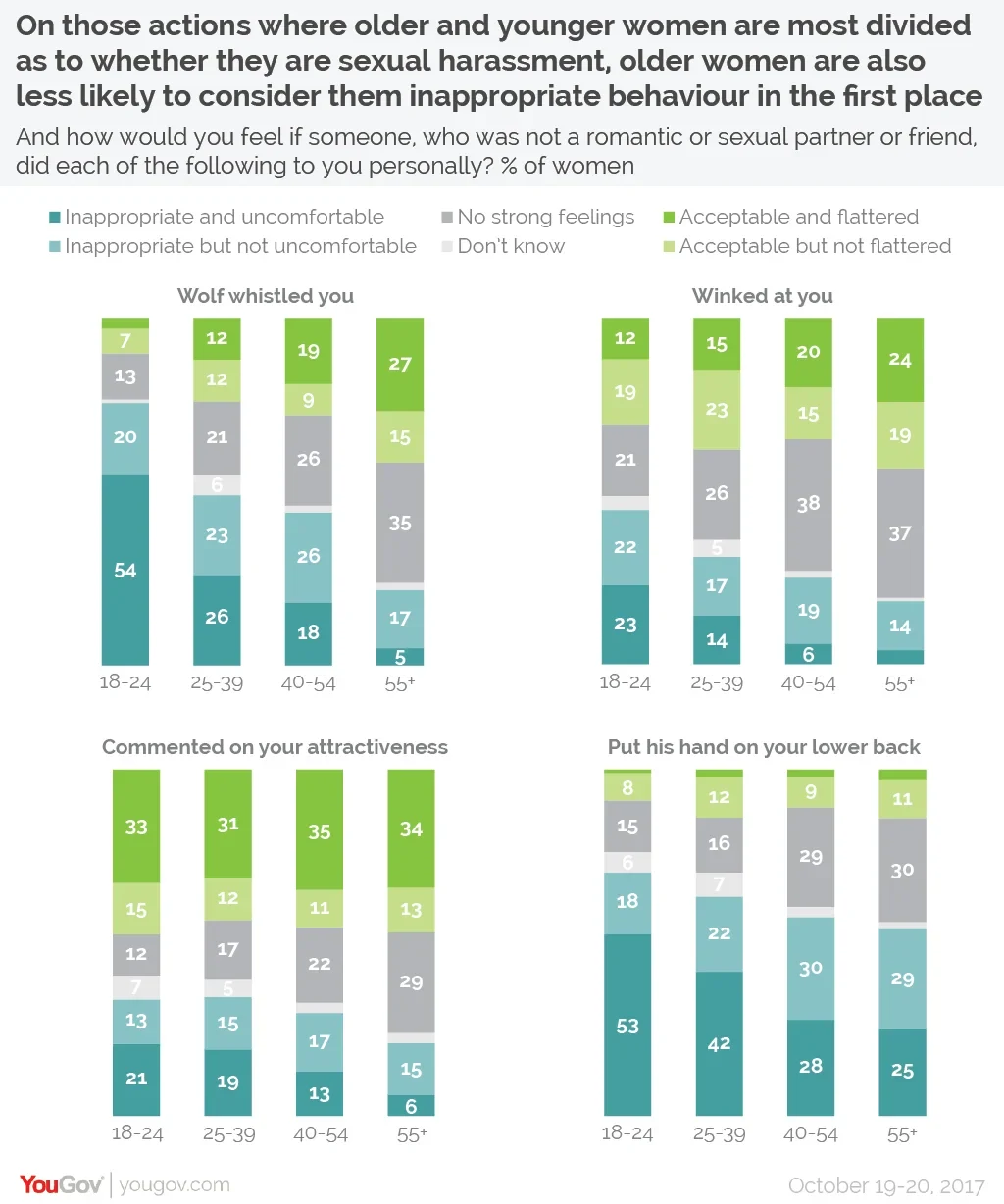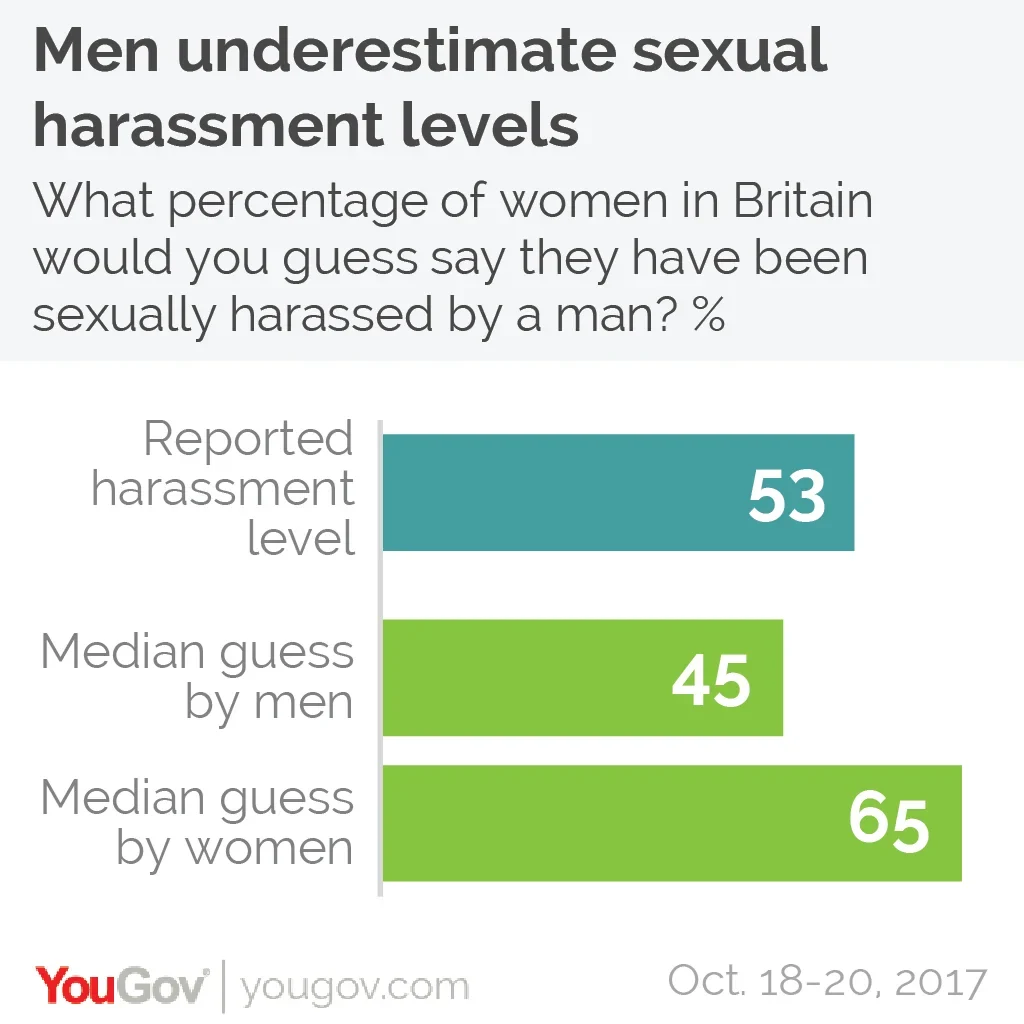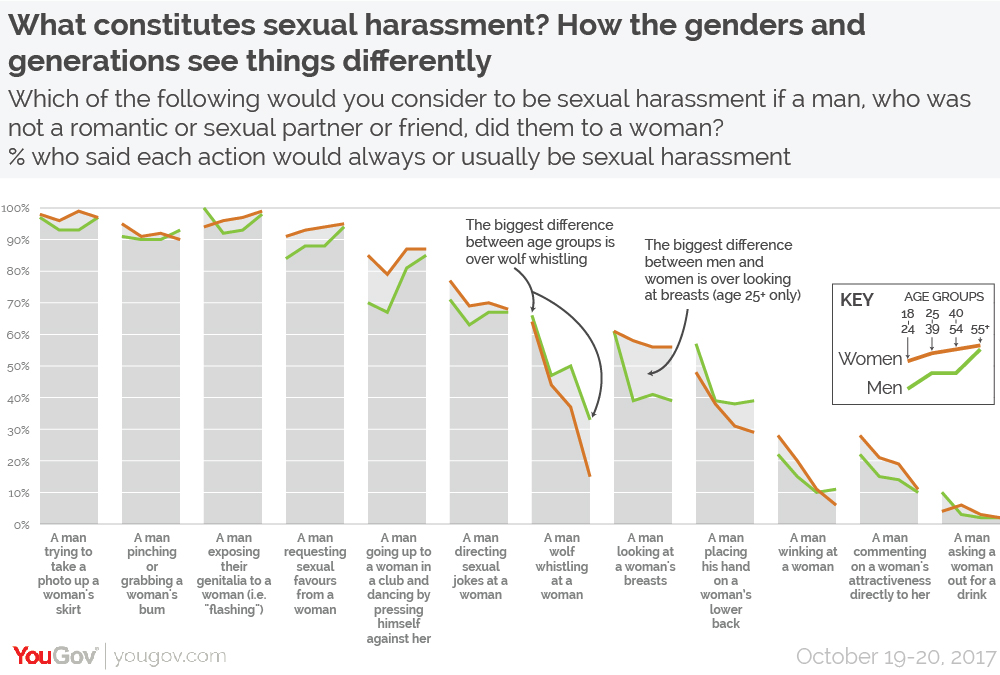New YouGov research explores what exactly people consider to be sexual harassment
The issue of sexual harassment is firmly in the limelight, following recent allegations about various public figures.
YouGov's recent survey on sexual harassment in public places shows that younger women are more likely than older women to say they have been harassed in the last five years. A separate YouGov survey showed a strong correlation between a woman’s age and whether or not she considered wolf whistling to be acceptable, with older women being much more likely to think it is.
This data raised the possibility that older women have different perceptions of what constitutes sexual harassment, and that this could also be part of the reason why fewer older women say they have been sexually harassed recently. (Although it is still likely to be the case that the largest factor is that harassers are more likely to target younger women).
In order to find out, YouGov has conducted a new study examining the difference in perceptions of sexual harassment both between men and women and across the generations.
Please note: All figures refer to the % of people who agreed to answer questions about sexual harassment
What constitutes sexual harassment?
YouGov asked respondents about 12 actions and asked whether they would consider each to constitute sexual harassment if done by a man to a woman who was not his friend or romantic/sexual partner. Many of the actions are very obviously sexual harassment, but some could be considered grey areas.
The genders and generations are broadly united on the more obvious and severe forms of harassment. More than 80% identify upskirt photos, bum pinching, flashing and requesting sexual favours as either always or usually sexual harassment.
The most divisive action asked about is wolf whistling. Two thirds (64%) of 18-24 year old women say that wolf whistling is always or usually sexual harassment. That figure falls with each subsequent age group to just 15% among women aged 55 or over.
After wolf whistling, the next biggest divisions between younger women and older women are when it comes to winking (28% of 18-24 year old women said is usually or always harassment, compared to 6% of the over 55s), a man touching a woman’s lower back (48% vs 29%) and commenting on a woman’s attractiveness (28% vs 11%).
Broadly speaking, the differences in opinion between female generations were also present among men. The issues that divide the genders the most are looking at a woman’s breasts (which women are more likely to see as sexual harassment, at 57% compared to 43% of men) and wolf whistling (which men are more likely to consider harassment, at 45% compared to 33% of women).
It might not be harassment, but is it acceptable?
While older women may not see certain actions as sexual harassment, is it actually that they consider them perfectly acceptable behaviour or do they still believe them to be inappropriate, albeit not specifically sexual harassment?
To test this, we asked women how they would feel if someone who was not their friend or romantic/sexual partner did each of those same actions to them personally.
Among the four actions that most divide younger and older women – wolf whistling, winking, touching a woman’s lower back, and commenting on attractiveness – there are indeed noticeable differences in sentiment between the generations. Older women are significantly more likely than their younger counterparts to say that they do not find these behaviours inappropriate.
Again, wolf whistling is the most divisive behaviour. Almost three quarters (74%) of 18-24 year old women consider it inappropriate, compared to just over a fifth (22%) of females in the 55+ age group. Indeed, four in ten (42%) women aged 55 and over say it is acceptable behaviour (including 27% who'd find it flattering), while another 35% have no strong feelings on it.

For the remaining three behaviours, the bulk of the difference between generations comes down to older women being more likely to say they wouldn’t have any strong feelings about them either way, whereas younger women are more likely to consider them inappropriate.
Perceptions differ on how widespread harassment is
Ultimately, while the research uncovers how women of different ages see sexual harassment differently, it does still suggest that the largest reason that older women are less likely to say they have been sexually harassed recently is simply because they haven’t been.
For instance, while older women are far less likely to say they have been harassed in the last 5 years (41% of 18-24 year olds, compared to 6% of 55+ year olds), they are just as likely to say they have ever been sexually harassed (50% and 52%, respectively).

It is on this final measure that YouGov discovered another difference in perceptions, between both the genders and the ages. When asked to guess what proportion of women say they have ever been sexually harassed, men are more likely to underestimate the figure (the median guess among men was 45%, compared to the 53% of women who told us they had ever been sexually harassed), while women are more likely to overestimate (with a median guess of 65%).
On top of this, the overestimate was stronger among young women than older women. While the median guess among 18-24 year old women was that 70% of women say they have ever been harassed, this fell to 60% among those aged 55 and over.
Photo: Getty







